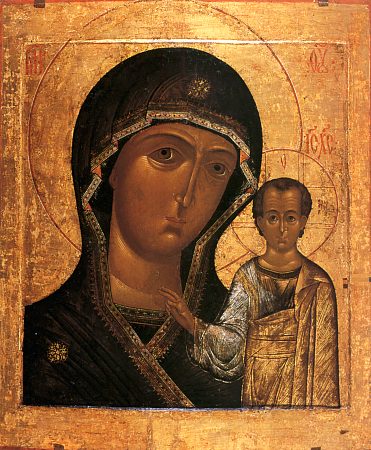By Kyriaki Christodoulou, Philologist
“Neither is man independent of woman, nor woman independent of man, in the Lord” (1 Corinthians 11:11)
The Orthodox Church elevates woman as a person by giving her a vital role in the development of young people and their presence in society. Contrary to timeless perceptions and realities, which want women to be marginalized, the Church suspends any discrimination between the sexes by considering men and women as equal members of a Body, endowed with the same spiritual gifts and with a common goal of Communion with God.
The exaltation of woman finds its highest expression in the face of the Virgin Mary and especially in her contribution to the incarnation of the Son and Word of God. The Theotokos is the ideal, beauteous and wonderful woman, a constant model of every Christian. Throughout the history of the Church, however, we find women – role models, holy women who with their virtue served both God and man. The Canaanite and the bleeding women teach with their faith and perseverance. The weeping prostitute becomes the supreme example of repentance. The Samaritan woman – Saint Photini, Priscilla, Lydia, Saint Thekla and countless other women contribute in the work of preaching. Emmelia, Nonna, Anthousa become real mothers. Olympias, Phoebe, Pentadia, Abroukla, Siviniani were ordained deaconesses and devoted with reverence to their multifaceted work. The role of the deaconesses was very decisive in the Church and the respect for them is universal. It should be clarified, however, that they did not undertake any service related to the Altar.
Many women today are dedicated to the same ministry work, in the context of a variety of activities of their Parish, whether they are related to charity, or to catechism and Christian education in general, or to other spiritual events (camps, conferences, etc.). The participation of women in this ministry work is inextricably linked to the special feminine nature and spirituality. In this way, the woman utilizes her personal and innate gifts, dynamically offering her share in the liturgical life of the Church as a worship community. No one can deny that the life of a Parish is largely based on the love, sacrifice and offering of all these women.
Previously, worthy women – mothers were mentioned, with Panagia – Mother of God, being the first honored person. The role of the woman, therefore her position in the Church, as a mother, fully values the female existence. The greatness of motherhood, which includes, in addition to childbearing and the upbringing of children, makes women the first collaborator in the creation of a human being, that is, as a source of life. She is the nucleus of the cell called family – society.
In the context of women’s work, the importance of female monasticism, which contributed to the elevation of the position of women in the Church, should not be overlooked. This declares not only their social role and contribution to worldly life, but also their spiritual power in monastic life.
The uniqueness of the woman and the functions she performs in the Church make her undoubtedly a member equal to the man. In Orthodoxy, respect for individuality is a fundamental principle. Thus, the concept of equality is not used within Orthodoxy, whether the concept of equality between the two sexes, between persons is being supported. The fact that women are excluded from the sacrament of the priesthood, means in no way a devaluation of the Woman, as some want to see it. Priesthood is not an ecclesiastical profession, nor is it of a formal or customary nature. It is a Mystery instituted by Jesus Christ himself, given by Him only to the Apostles and to the successors of their work, the Men-Clergy. Why this possibility was given only to males is interpreted humanely as due to purely practical and biological reasons. Man, after all, is called with faith – trust in Him to accept and live the divine truths and actions. This fact, however, does not detract from the value of the woman as a person. After all, the possibility of sainthood exists freely and equally in both sexes. Let us not forget the following: The body has many parts and each part has its own mission, which with its value and uniqueness contributes to the overall harmony.
Source: Church of Cyprus
